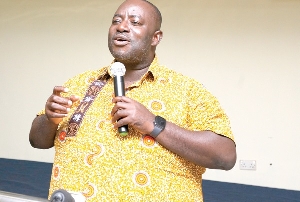Ofosu Asamoah, the Executive Secretary of the National Labour Commission (NLC), has revealed that the tripartite committee responsible for addressing the paternity leave proposal has successfully completed its work.
He stated that the final draft will be submitted to the Minister of Employment and Labour Relations, eventually reaching the cabinet and Parliament for approval or consideration.
The committee, comprising representatives from labour unions, the NLC, and government officials, discussed proposals for paternity leave, suggesting either a one-week or one-month leave duration.
Additionally, the unions advocated for an extension of maternity leave from three to six months.
"The tripartite committee received the proposal from the unions that they want paternity leave. With the maternity leave, they also proposed it to be increased from three months to six. We have done with the deliberations; it will go to cabinet for a review after the Minister has received it and then taken to Parliament," 3news.com quoted the Ofosu Asamoah
Before reaching the Minister, Mr. Asamoah mentioned that stakeholder engagement would continue, seeking the perspectives of various groups, including women and the media.
"We are done with the deliberations, and so we will present the final draft to the Minister of Employment and Labour Relations for onward submission to Cabinet and to Parliament, he emphasized.
Meanwhile, Member of Parliament for Madina, Francis-Xavier Sosu of the National Democratic Congress (NDC), is sponsoring a private member's bill proposing an amendment to extend maternity leave from three to four months.
The bill, known as the Labour (Amendment) Bill, 2023, also advocates for paid paternity leave for men, ranging from a minimum of seven days to a maximum of four weeks, with an option for an additional two weeks in specific circumstances.
Franics Sosu emphasized the bill's intent to provide new mothers adequate time for childbirth, breastfeeding, and recovery before returning to work.
He stressed the importance of paternity leave, allowing men to support their wives and assist with domestic responsibilities.
Noting Ghana's maternal mortality rate, he highlighted the need for legislative measures to align with international standards for maternal health.
General News of Friday, 2 February 2024
Source: www.ghanaweb.com













